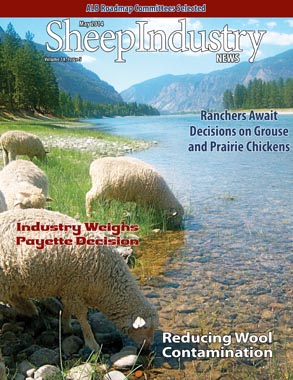
- May 2014
- President’s Notes
- Market Report
- Industry Weighs Payette Decision
- Producers Now Eligible for USDA Disaster Assistance
- ESA listing of Sage Grouse
- Parentage Test Could Benefit Sheep Producers
- Sheep Begin Fire Break Duties
- Don’t Let Your Farm be Fodder for Activists
- Reducing Contamination Vital to Wool Quality
- Data-Driven Approach
- ASI Awarded MAP, FMD Funding
- Obituaries
- Business Spotlight
- ASI News Briefs
- ALB Roadmap Committees Selected
Animal Ag Alliance: Don’t Let Your Farm Be Fodder For Activists
Mary McArthur
Western Journal
Farmers and ranchers should not pretend that animal rights activists don’t exist, says the head of an animal agriculture organization. Instead, they should farm like they are on YouTube. Kay Johnson Smith, president of the Animal Agriculture Alliance, said the goal of animal rights groups is to eliminate animal agriculture. Consumers want what livestock farmers produce, but farmers shouldn’t give consumers a reason to quit eating meat.
“Take an honest look at all your operations. Would someone from a non-farming culture think that it is positive?” Johnson Smith asked the Alberta Farm Animal Care conference.
Instead of ignoring animal rights activists, Johnson Smith advised farmers to become their own undercover agents, identifying their vulnerabilities or parts of the farm they wouldn’t want the public to see. “Teach employees exactly how you want animals to be handled,” she said. U.S. animal activist groups filmed more than 70 undercover videos last year. They weren’t used to show farmers how to improve their management techniques but to create fear and mistrust among consumers. Mercy for Animals recruits people willing to work undercover. They even ask for donations to offset the cost of the undercover investigations in dairy, eggs, pig barns or slaughter plants.
“The issues are equivalent. We all have vulnerabilities.”
Johnson Smith said farmers should have an online presence through Twitter, Facebook or a website where the consumer can put a face to the farm. Posting photos of all parts of the farm allows consumers to see what modern farming is about. The American Meat Institute posts videos on its website of a working packing plant to show that the slaughter is done humanely. Multigenerational farms should highlight their farm roots. Also, post the farm’s animal care and animal welfare policies.
“Put the right picture out there. Don’t let the Humane Society of the United States define you by their pictures,” Johnson Smith said.
Farmers should also know animal activist groups better by attending their meetings and receiving their newsletters. Activist groups targeted restaurants and retailers last year in an attempt to persuade them to dictate to farmers how to raise livestock,said Johnson Smith. Mercy for Animals owns shares in companies and often introduces resolutions at meetings asking for the banning of practices such as housing hens in cages and sows in stalls. More than 400 animal rights organizations operate in the U.S., and they all have the fundamental belief that animals should not be raised for food.
“These groups want the conflict. If they were to solve the problem, they would have nothing to fundraise on.”
Johnson Smith said they have millions of dollars to spend on lobbying, advertising and conducting campaigns to make farmers look bad. Mercy for Animals pays university students $1 to watch videos of animals harmed during production and asks them to pledge not to eat meat at least one day a week.
“Part of the goal is to make vegetarianism appear popular and trendy,” she said. “If these kind of campaigns sound hip, they may have more chance attracting young people and a high school audience.”

